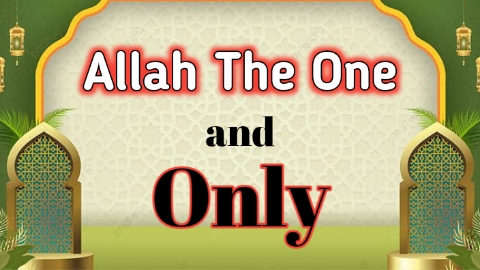
In the deepest corners of the human soul lies a longing—a yearning for something constant, something true, something that never fades. For the believing heart, that answer has always been one: Allah the One and Only.
He is the Unseen yet Ever-Present, the Uncreated Creator, the Master of the heavens and earth. Unlike anything we can imagine, Allah exists beyond time and space—One without partner, One without equal, and One without need. To believe in His Oneness (Tawheed) is to give our hearts clarity in a world full of illusions.
What Does It Mean to Believe in “Allah the One and Only”?
Believing in Allah the One and Only is more than a declaration—it is a deep conviction that shapes a person’s life, choices, and purpose. This belief is central to Tawheed, the foundation of Islam. It means:
- Allah alone created everything.
- He alone controls the universe.
- He alone deserves worship, praise, and obedience.
The Qur’an affirms this eternal truth in countless verses. One of the most well-known is Surah Al-Ikhlas:
“Say: He is Allah—the One and Only. Allah, the Absolute and Eternal. He neither fathers nor was He ever born. And there is none equal to Him in any way.”
(Surah Al-Ikhlas, 112:1–4)
This short chapter carries the weight of pure monotheism. Reciting it brings immense reward, but living by its message transforms hearts.
Knowing Allah Through the Quran
The first step to forming a real relationship with our Creator is to know Allah through the Quran—His direct speech to humanity. Unlike human books, the Qur’an speaks with unmatched depth. Every verse is a window into the majesty, mercy, and wisdom of Allah the One and Only.
“Verily, your Lord is Allah—the One who created the heavens and the earth in six days—then ascended above the Throne, managing all affairs with perfect wisdom.
[of the universe]…”
(Surah Yunus, 10:3)
Reading the Qur’an with sincerity and reflection softens the heart and strengthens the soul. It allows us to feel closer to Allah—not only in prayer but in every moment of life.
The Beautiful Names of Allah: A Path to Connection
In the Qur’an and Hadith, Allah introduces Himself by 99 Beautiful Names (Asma’ul Husna). These names are more than labels—they are doors to deeper understanding.
When we learn that Allah is:
- Al-Wadud (The Most Loving), we discover that we are never unloved.
- Al-Hakeem (The All-Wise), we begin to discover Allah’s wisdom even in pain.
- Ar-Razzaq (The Provider), we are reminded that trust in Allah always brings contentment.
The Prophet ﷺ said:
“Allah has ninety-nine names. Whoever commits them to memory and understands their meanings will be granted entry into Paradise.”
(Sahih Bukhari & Muslim)
Reflecting on these names helps our love for Allah grow here, not just in ritual acts, but in everyday struggles and successes.
Worshiping Allah Alone: The Soul’s Highest Purpose
Every soul was created with one ultimate purpose: to worship Allah alone. This isn’t limited to salah or fasting—worship includes any act done with the intention of pleasing Him.
“And I did not create jinn and mankind except to worship Me.”
(Surah Adh-Dhariyat, 51:56)
Feeding someone hungry, smiling at a stranger, resisting anger, or even earning halal income—all of these are forms of worship when done for Allah the One and Only.
True worship is not heavy. It is freedom—from ego, from materialism, and from false idols. It is what lets the heart truly seek Allah’s guidance now, in every matter, big or small.
Trust in Allah Always: Even When Life Feels Unfair
It’s easy to believe when life is smooth. But real faith is proven in uncertainty—when plans fail, doors close, and pain becomes personal. That’s when trust in Allah always becomes more than words.
“…But perhaps you hate a thing and it is good for you.”
(Surah Al-Baqarah, 2:216)
Sometimes what we see as setbacks are actually signs, gently redirecting us. Allah, the One and Only, possesses knowledge of all that is hidden from us. He sees what we cannot. And when we remember this, we begin to understand Allah’s mercy, even in hardship.
A Story to Remember: The Desert and the Camel
The Prophet Muhammad ﷺ once asked his companions, “Do you see this woman throwing herself toward her child?” They said, “Yes.” He then said:
“Allah’s mercy toward His servant exceeds even the profound love a mother feels for her child.”
(Sahih Bukhari & Muslim)
Imagine a mother running to protect her baby in the desert. Now multiply that love infinitely—that’s how much Allah cares for His creation. This is why a believer never loses hope, no matter how far they’ve strayed.
Living With the Light of Tawheed
When we live with the belief in Allah the One and Only, everything changes:
- We no longer seek validation from the world.
- We don’t panic when others abandon us.
- We aren’t jealous of people’s status or wealth.
Why? Because we understand that everything comes from Allah, and only He can truly give, withhold, or elevate. This mindset brings unmatched peace—it is the peace that comes when you love Allah more than anything else.
Final Reflection: Let Allah Be Enough
In a time where people chase false lights—status, fame, possessions—Allah the One and Only remains the eternal flame of truth. He is not just part of our lives—He is our life.
“Is Allah not sufficient for His servant?”
(Surah Az-Zumar, 39:36)
Yes. Allah is sufficient. Always has been. Always will be.
Let us return to Him fully—with our thoughts, hearts, and actions. Let us worship Allah alone, remember His names, and place full trust in His plan. Because in the end, when all else fades, only Allah the One and Only remains.
For more information visit our website ( Hashmi Education Hub )
